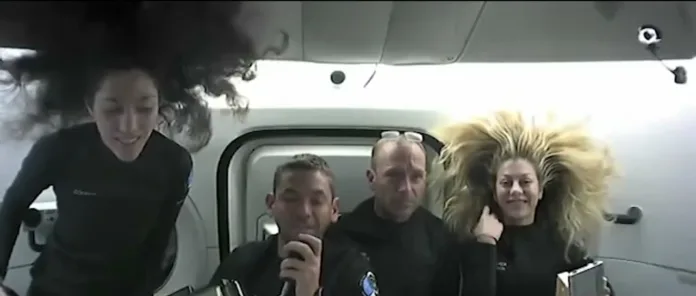Crew member held for observation following SpaceX return from ISS released in good health, says NASA.
A NASA astronaut who was briefly hospitalised following a return from the International Space Station (ISS) has been released and is in good health, the space agency confirmed on Saturday. The astronaut, who has not been publicly identified, was held for observation after landing in the Gulf of Mexico on Friday, along with three other crew members, aboard a SpaceX capsule.
The mission included NASA astronauts Matthew Dominick, Michael Barratt, and Jeanette Epps, as well as Russian cosmonaut Alexander Grebenkin. Following the splashdown near the Florida coast, all four crew members were flown to a nearby hospital for routine medical checks, as is standard after extended periods in space. After their initial assessments, Dominick, Barratt, and Epps were released and returned to NASA’s Johnson Space Center in Houston. However, one astronaut remained under observation due to an unspecified health issue.
NASA has refrained from disclosing the nature of the medical condition or identifying the astronaut involved, citing privacy protocols. The agency did, however, confirm that the individual is “in good health” and expected to “resume normal post-flight reconditioning” with the rest of the crew in due course.
The crew’s return marked the conclusion of a months-long ISS mission, which initially began in March. Although initially scheduled to end two months earlier, their return was postponed due to delays involving Boeing’s Starliner astronaut capsule and complications from Hurricane Milton.
NASA’s post-flight reconditioning process is a routine but essential phase that helps astronauts readjust to Earth’s gravity after extended exposure to microgravity. This period typically involves a series of physical exercises and health checks to monitor and support the body’s adaptation back to Earth conditions.
NASA’s protocol for post-mission health evaluations prioritises both crew safety and health privacy. For extended missions such as this one, astronauts undergo extensive checks to ensure their physical well-being, given that prolonged exposure to space environments can impact muscle tone, bone density, and cardiovascular health. The agency’s statement indicates that the entire crew, including the astronaut who required additional observation, is on track to resume normal post-flight activities.
The SpaceX capsule landing and subsequent health evaluations underscore the unique challenges astronauts face when returning from space. Despite advancements in space travel, the transition back to Earth remains a complex process. Parachuting into the Gulf of Mexico allows for a controlled descent and recovery by nearby support teams, who quickly transfer the crew for medical assessments. For NASA, timely response and hospital checks are integral to ensuring the ongoing health and safety of its crew members, both on and off the planet.
As the astronauts continue their reconditioning, NASA and its partners focus on learning from each mission’s outcomes, improving safety protocols and mission readiness. With upcoming projects that include Boeing’s Starliner capsule and further explorations beyond low Earth orbit, NASA remains committed to refining the astronaut recovery process, taking each return as an opportunity to enhance safety protocols and health standards for future crews.
The journey back to Houston signals the end of yet another successful space mission, with the crew’s health recovery as the immediate priority. As NASA gears up for its next ventures, including potential lunar missions, these insights into post-flight health management serve as building blocks for future long-duration missions, highlighting the resilience of astronauts and the dedication of space agency teams who ensure safe journeys to and from space.
